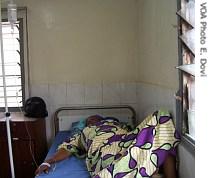2007年VOA标准英语-Ghana Fights Economic Impact of Malaria(在线收听)
Accra
25 April 2007
Progress has been made in reducing malaria cases in Ghana, but the disease continues to be a primary health concern in the country as well as an economic burden. As the West African nation joins the rest of the continent to mark Africa Malaria Day, Ghana's health authorities are looking at new ways to fight the disease. Efam Dovi has more from Ghana's capital, Accra.
This is Iran Clinic in Accra, one of the few private health institutions that treat patients under the Ghana government's recently introduced national health insurance plan.
 |
| Humu is receiving IV fluid to help treat a Malaria infection at Iran Clinic in Accra |
She says she has been ill for the past two weeks.
She says her heart beats fast when she walks and she feels dizzy.
She says she has body pains and fever. Humu says she could not sleep the previous night, so today she came in to see the doctor. She says she has been given some drugs and she is to be administered with IV fluid.
A senior medical officer at the clinic, Zakaria Adam Abubakar, diagnosed Humu with malaria. He says about 75 percent of the patients who report to the clinic suffer from malaria, especially during the rainy season. That is above the national average of about 40 percent of all hospital attendance.
Abubakar says malaria is diagnosed both clinically and through laboratory examination.
"From our experience and malaria being endemic in Ghana and, for that matter, the West African sub-region, when somebody comes with malaria he comes with chills, feeling cold, sweat," he said. "He is feeling cold with rigor but the temperature is very, very high and then also we have bitterness of the month and also lost of appetite and headache."
Ghanaian health officials say the number of malaria cases has gone down in the last three years.
They credit the World Health Organization's (WHO) certified combination-drug therapy, which now replaces ineffective single drug treatment. They also cite other interventions, such as increased use of insecticide-treated mosquito-bed nets.
But the disease continues to be a major health problem. It is blamed for low productivity and costs the government about $88 per case.
"For somebody to be in the house for a week or sometimes to two weeks, you can imagine the economic impact, absenteeism from work and then excuse duties," added Mr. Abubakar.
Malaria is said to affect about 3 million people in the country's workforce. Aba Baffoe-Wilmot is deputy head of Ghana's National Malaria Control program.
"The impact on the workforce, itself, and the families of the workers, if a worker, a man going to work and the family is not well, of course this person is not going to work with a clear mind," she noted.
Officials of the program recently met with business leaders, urging them to support the fight against malaria, because of the burden the disease imposes on their businesses.
Baffoe-Wilmot says businesses can help by subsidizing insecticide-treated mosquito bed nets for their workers; by supporting indoor residual spraying programs to stop the breeding of the mosquito that causes the disease; as well as carrying out malaria control activities for their workers and dependents.
In a world economic forum survey, 72 percent of business leaders believed malaria eradication would increase efficiency and production.
Syvester Mensah participated in the meeting and says it makes economic sense for everyone to play a role in eradicating malaria.
"Oh yes, it does, not only corporate bodies but individuals, households, everyone walking the streets of Ghana has a role to play, has a contribution to make in order to eradicate malaria if possible, and I think that I share in that wisdom," he said.
Baffoe-Wilmot also talked about other strategies being adopted to scale up the "Roll Back Malaria" program in Ghana, which is substantially supported by the Global Fund.
"When it comes to the integrated control, we are, in addition to the bed net, looking at the environment - environmental management," she explained. "We will also be looking at spraying, we will look at IRS, [indoor residual spraying] we will also look at larviciding. At least if we will not be able to clear, let us say, a place which is breeding the mosquito, we can always use larvicides to suppress the development of the mosquitoes."
Malaria thrives in hot temperatures that enable the parasite that causes the disease to mature more quickly in the bodies of the mosquitoes that carry it. The disease yearly cost the African continent about $12 billion in economic losses.